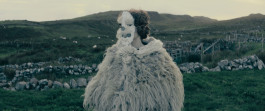Maolaigh

Maolaigh, 2K Anamorphic Film, 2025, Single Screen Film & Installation
Maolaigh primarily shot on Clare Island, off the west coast of Ireland, explores an alternate biography following a fictitious younger self Maolaigh, who journeys back to the ancestral home of Gráinne Mhaol, the legendary 'Pirate Queen.'
Grainne Mhaol appears as a ghostlike spirit guide, weaving subtly alongside glimpses of an older trans* Maolaigh, the artists own presence attempting to pass within a contemporary farming community whilst vaguely weaving personal, historical, and collective memories of loss.
The Title “Maolaigh”, from “mhaol” (to become bald, bare, unprotected), is inspired
both by the life of Grainne Mhaol and the desire to re-learn Gaeilge, as a decolonial act; searching for a voice to reclaim or reconcile the traumas passed down, yet through silence, behind grey stone walls, empty convents, inaudible utterances, drowned in cures.
Like the life story of Grainne Mhaol, this film project troubles ideas of “self” forged by
individualism and identity politics, critiquing both the nature-culture opposition which
informs identity formation in modern Western sociétés and the patriarchal destruction
of the natural world caused by capitalism and colonialism.
The film renounces a traditional treatment and script towards conducting an experiment in fabulative ethnography, using (auto)ethnography, performances and multi-species encounters as methodologies enabling to unlock an emancipated,
queer temporality (or in T.J. Demos’ words, “chrono politics”): a temporality located in
an undetermined not-yet, always-already there for us to rescue and reassess
suppressed possibilities
Through these narrative explorations, Maolaigh became a magical realist meditation,
blurring boundaries between inner and outer worlds and seamlessly integrating gender,
temporality, and identity.

Written & Directed by Doireann O’Malley
Produced by Emma Moore, Doireann O'Malley
Cinematographer: JOAKIM CHARDONNENS SCS
Sound design and Composition: Lugh O’Neil
Edited by : Rob Crosse & Sarah Schneider
Cast
Cara O’Malley Lloyd
Charles (Charlie) McDaid
Donal Moran
Beth Moran
Annette O’Malley
Rosy Sanders
Extras ram fair:
Frank O’Malley
Sean O’Malley
Joe O’Toole (farmer watching)
Storm (dog)
Michael Mac (sheep farmer)
Second Unit Cinematographer: Alba Fernadez
Jakub Bajerski – 1st Camera Assistant / Focus Puller/Steady Cam Operator
Aimee Stones – 2nd Camera Assistant
Elena Bridgeman – Camera Assistant/Focus Puller
Sound Recordist : Lugh O’Neill
Charlie McCabe – Sound Assistant
Alice McCabe – Production Assistant
Colour grading: Joakim Chardonnens
Subtitling: Sarah Schneider
Production & Administration in development: Denise MacDonagh, Culture on a Budget.
Song: Spiders in Space by Donal Moran
Music mixing and Mastering: Lugh O’Neil
Accommodation:
Clare Island Studio Cottage
Phil’s Apartment, Clare Island
Macalla Organic Farm
Glenkeen Gardens Residency
Funded by The Arts Council of Ireland
Supported by RHA Clare Island Residency
Crespo Foundation: Glenkeen Gardens Residency
Mayo Co.Council
© 2023 Doireann O´Malley